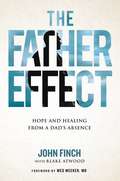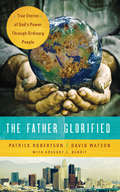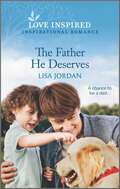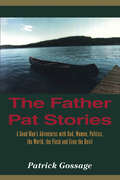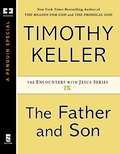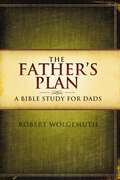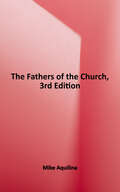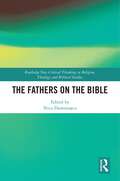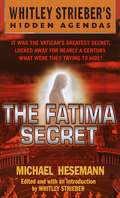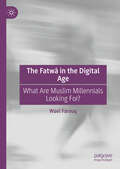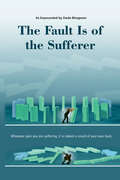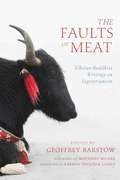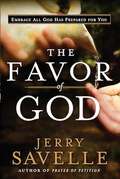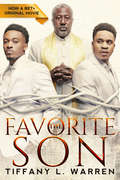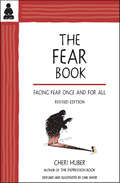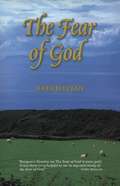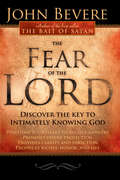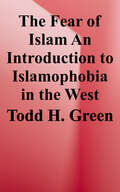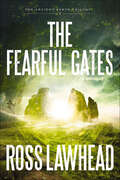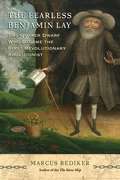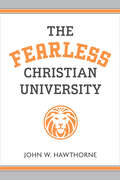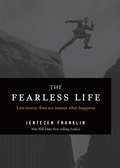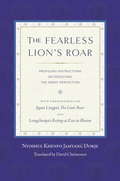- Table View
- List View
The Father Effect: Hope and Healing from a Dad's Absence
by Blake Atwood John FinchBased on the feature film of the same name, THE FATHER EFFECT is a must-read for the millions of men and women who have lost their fathers through divorce, death, or disinterest.John Finch always struggled after his father committed suicide when he was eleven, but it wasn't until he was raising his own three daughters that he truly understood their futures relied on his coming to terms with his difficult past. To move forward, he needed to forgive both his father for choosing to leave, and himself for not being the best father he could be.This journey led to THE FATHER EFFECT, a book containing practical help for anyone, man or woman, with a deep father wound from losing a dad through divorce, death, or disinterest. Through positive lessons on forgiveness and approachable advice on how to change your legacy as a parent, partner, and person, THE FATHER EFFECT is the ultimate healing tool for anyone who has suffered the absence of a dad.
The Father Glorified
by David Watson Patrick Robertson Gregory C. BenoitLearn the best methods for winning people to Christ with the help of CityTeam Ministries. In a follow up to their book Miraculous Movements, the missionaries of CityTeam share more insights into how best to share God's love around the world. The authors take you beyond their work in Africa to California to show how the biblical principles used by the early church in the Book of Acts can work for us today.This book highlights the key scriptural principles that help Christians use faith-based discipleship to reach out in love in their own communities. The authors outline the principle of service to others that open doors of opportunity to the work of the gospel.Features include:Biblical principles for reaching new people for ChristWays to lead people to Christ by leading them through the story of the BibleStories of Gods work around the world
The Father He Deserves
by Lisa JordanA determined dad. A wary mother. Making amends is never easy… Injured in a kayaking accident, champion Evan Holland returns home to train rescue dogs. But his unexpected partner is the woman he left behind, Natalie Bishop. And she has a secret: a son Evan never knew he had. Now Evan must prove he can be a real father. But earning Natalie&’s trust back will take hope, forgiveness—and risking everything on forever…From Love Inspired: Uplifting stories of faith, forgiveness and hope.
The Father Pat Stories
by Patrick GossageFather Pat Cheyne, an unkempt, middle-aged priest on a lone canoe ride reflects on how these solitary meditations in his beloved canoe have marked his life. His thoughts reach back to his boyhood rejection of the boisterous ways of his father, just home from the war, to the memorable evening when he first prayed, eyes open, floating in a silent magic space with stars drenching the sky above and mirror lake below him. Even now, the canoe remains his own vehicle for understanding solitude. The Father Pat Stories chronicle the Anglican priest and former member of Parliament’s pattern of engagement and disengagement as he very actively applies tolerance and forgiveness to his parishioner’s difficulties in a world where religion often stands for intolerance and exclusion. The fast paced adventures engage a tight trio of friends Father Pat, his public relations pal, Terry, and their mutual big city reporter friend, Deirdre. The odd trio get all too intimately involved with each other and in problems, personal and institutional in Ridgewood, Father Pat’s suburban parish.The yarns, almost parables, present a good man through a lifetime of friendships and loves.
The Father and His Family
by E. W. KenyonThis Book is a reinforcement to the Bible in the Light of Our Redemptionl
The Father and Son
by Timothy KellerTimothy Keller, renowned pastor and New York Times bestselling author, examines Jesus' ascension into Heaven and why this act is an important resource for Christians in The Father and Son, the ninth installment in his Encounters with Jesus eBook series. Jesus' ascension into Heaven--the end of his earthly life--is one of the most puzzling moments in the Gospels. It marks the moment when Jesus was no longer limited to a specific point in space and time. In The Father and Son, Timothy Keller, pastor of New York's Redeemer Presbyterian Church and New York Times bestselling author of The Reason for God, explains why this means our encounters with Jesus can be richer now that he available to us in all times and places.
The Father's Plan: A Bible Study for Dads
by Robert WolgemuthExperience the Father's love and become a better dad.Married and single fathers will benefit from this study that explores the many issues facing dads from a biblical perspective. The Father's Plan: A Bible Study for Dads encourages men at every age and stage of life to strengthen their relationship with God, building a legacy of faith to leave for future generations. This seven-week study helps fathers explore fatherhood in the light of the Bible's teachings. The personal reflection questions will draw fathers into quality personal time with their Heavenly Father, and the group discussion questions will lead dads to reflect on their legacy and to grow in their God-given role.
The Fathers of the Church: An Introduction to the First Christian Teachers
by Mike AquilinaThis new and extensively updated edition is the definitive resource for anyone interested in learning about the Church Fathers and their legacy. It is ideal for RCIA, catechists, clergy, and lay Catholics who want to learn more about the great teachers of early Christianity.
The Fathers on the Bible (Routledge New Critical Thinking in Religion, Theology and Biblical Studies)
by Nicu DumitraşcuThis book offers an overview of how the Church Fathers used and intepretated biblical texts. It brings together a range of different Christian confessional and social perspectives to explore the biblical basis and impact of their thinking. The contributors cover different ages and traditions, with each chapter focusing on a specific individual and theme. The book takes an ecumenical approach to the relationship between the Church Fathers and Holy Scripture and fosters a better understanding of the relationship between Christian tradition and the Bible. It will be of interest to scholars of Christian theology, the history of Christianity, biblical studies and patristics.
The Fatigue of the Shari‘a
by Ahmad Atif AhmadThe Fatigue of the Shari'a places on a continuum two kinds of debates: debates in the Islamic tradition about the end of access to divine guidance and debates in modern scholarship in Islamic legal studies about the end of the Shari'a. The resulting continuum covers what access to divine guidance means and how it relates to Shari'a.
The Fatima Secret (Whitley Streiber's Hidden Agendas)
by Michael HesemannThe Lady of Fatima left a final prophecy so powerful that no pope in over eighty years had dared to reveal it. Why? The third secret is contained on a page of parchment written by the last surviving witness to the miracle. . . and hand delivered to the Pope. Even now, after the Vatican has released their version of the contents of the third secret, intense debate rages as to whether the Church has revealed the truth. Here, for the first time, is a complete inquiry into the mystery of Fatima: what the three shepherds really witnessed, the astonishing turn of their lives, the unfolding of the prophecies, and how the Fatima secret has dominated Pope John Paul's reign and changed world history. Was the Fatima prophecy a warning to the Pope. . . or a vision so dire it must be suppressed at any cost?
The Fatwā in the Digital Age: What Are Muslim Millennials Looking For?
by Wael FarouqThe rise of a significantly large (and young) Muslim population in the West, possessing no historical tradition of being a minority in a non-Muslim environment, has led to a recurring debate about the integration of Muslims into Western societies and the compatibility of Islam with Western values. The proliferation of Islamic sites to which thousands of Western Muslims turn to request a fatwa, i.e. a religious legal opinion on any issue, hints at the urgency felt by these Muslims to find a way out of this conflictual dialectic, since most of their questions concern precisely how to reconcile Islamic principles with some aspect of modern life in the West. The pervasiveness of these internet fatwas is a striking phenomenon worth of study that can help finding answers to the longstanding debate about the integration of Muslims in the West and in modern societies. raising interesting questions: What do Muslims in Western societies ask these virtual muftis and why? Who are they? What are their desires and concerns? In their asking, are these Muslims seeking integration or separation? Do these questions reflect common clichés about Muslims, as conveyed by some Western media narratives or not? Do they reason as individuals or as members of a religious community? This book presents a scientific study aimed at answering these questions through a statistical and discourse analysis of a large corpus of more than ten thousand fatwa questions extracted from the huge fatwa databases available on the internet.
The Fault Is of the Sufferer
by Dada BhagwanThere are times in life when we must endure suffering due to no fault on our part – or so it seems. In painful circumstances, we naturally question, “Why me? Am I wrong? It’s not my fault!” Such situations may feel like the very definition of suffering. In the book “Fault is of the Sufferer”, Gnani Purush (embodiment of Self knowledge) Dada Bhagwan provides spiritual solutions to common and everyday forms of suffering such as dealing with difficult people, facing unhealthy relationships, challenges in family relationships, and marriage problems. Among the myriad of spiritual books available, Dadashri offers a unique resource - addressing the age-old question: “So, am I wrong, or am I faultless?” He provides profound insight into the law of karma – explaining who is “The Doer”, who is at fault, and what is the cause in every instance of suffering. Whether seeking relationship tips, marriage advice, or simply to learn how to stay healthy, this book will prove an invaluable resource.
The Faults of Meat: Tibetan Buddhist Writings on Vegetarianism
by Geoffrey BarstowVegetarianism is a hotly debated topic within Buddhist circles. This book provides a valuable new contribution to the discussion with translations of thirteen Tibetan texts focused on the ethical problems associated with eating meat, coming from a wide variety of perspectives and lineages.Should all Buddhists be vegetarian? Vegetarianism is an important topic of debate in Buddhist circles—some argue that Buddhists should avoid meat entirely while others suggest that it is acceptable. For the most part, however, this ethical query has been conducted in the West without consulting traditional literature on the subject. The Faults of Meat brings together for the first time a collection of rich and intricate explorations of authoritative Tibetan views on eating meat. These fourteen nuanced texts, ranging from scholastic treatises to poetic verse, reveal vegetarianism as a significant, ongoing issue of debate for Tibetans across time and traditions, with a wide variety of voices marshaled against meat, and a few in favor. Authors include many important Tibetan teachers: Dolpopa Sherab Gyaltsen (1292–1361) Khedrup Jé (1385–1438) The eighth Karmapa, Mikyö Dorjé (1507–1554) Shabkar Tsokdrük Rangdröl (1781–1851) Khenpo Tsultrim Lodrö (1961– ) and many more. These Buddhist teachers recognize both the ethical problems that surround meat eating and the practical challenges of maintaining a vegetarian diet; their skilled arguments are illuminated further by the translators’ introductions to each work. The perspectives in The Faults of Meat are strikingly relevant to our discussions of vegetarianism today; they introduce us to new approaches and solutions to a contentious issue for Buddhists.
The Favor of God
by Jerry SavelleThe grace of God is often referred to as unmerited favor. In fact, the very meaning of grace is favor. In this extraordinary book written at a time when people need God's favor more than ever, Jerry Savelle shows how the favor of God is not only available to the believer, but also promised. Drawing from his own experience and his deep knowledge of the Scriptures, Dr. Savelle explains how to actively walk and grow in divine favor, and by doing so enjoy the practical as well as the supernatural benefits for such a time as this, when many are living in fear and uncertainty. The Favor of God will not just inspire readers. By God's grace and favor, it will empower them.
The Favorite Son
by Tiffany L. WarrenDo family, faith--and fame--go together? In this captivating novel from award-winning author Tiffany L. Warren, two brothers reach for the stars, but are they prepared for a fall?. . . They're handsome, smart, and musically gifted. Brothers Camden and Blaine Drake have put their talents together and founded a gospel group. The quieter one, Camden is the songwriter, while charismatic Blaine is the performer. At first, their Bishop father is against the idea--until Blaine, his favorite, wows the congregation with his performance at a church revival. Sure enough, once the bishop witnesses their effect on the crowd he wants them there every Sunday. But he may have set the stage for trouble. . .As the group's popularity grows, so do the groupies--and promiscuous Blaine is more than happy to share his love. Gigs across the country, meetings with music execs, a chance to sign with a major label, and a sexy new band member bring new connections--and dangerous new temptations. Soon, a slew of rumors and a shocking betrayal threaten to destroy the group--and the brothers' relationship. But one event is going to rock their world forever. Do they have enough faith, forgiveness, and brotherly love left to find harmony once more?...
The Fear Book: Facing Fear Once and for All
by Cheri HuberRather than explaining typical strategies for overcoming fear, this book examines how fear is an experience, how to recognize that experience as nothing more than conditioned reaction to circumstance, and how to mentor oneself into letting go of beliefs about "appropriate" responses to fear. The notion is debunked that fear is anything other than a label we have learned to put on a set of physical and emotional responses, which is a Buddhist view of emotion in general.The revised edition expands on many points and includes a series of exercises and new illustrations for recognizing fear for what it is and overcoming its devastating effects.
The Fear Of God
by John Bunyan Don KistlerIn this classic work by John Bunyan (author of Pilgrim's Progress), the author discusses what it means to fear (reverence, stand in awe of) God. This edition is a reprint, in which changes have been made to spelling, grammar and formatting. An introduction and outline are included at the beginning. Study questions for each chapter have also been added at the end of the book.
The Fear Of The Lord: Discover the Key to Intimately Knowing God
by John BevereUnlock the treasures of salvationIt is time to give God His due honor and reverence in a way that will revolutionize your life in your worship, prayers, and personal life.
The Fear of Islam: An Introduction to Islamophobia in the West
by Todd H. GreenThis volume investigates the context of Western views of Islam and offers an introduction to the historical roots and contemporary anxiety regarding Islam within the Western world. Tracing the medieval legacy of religious polemics and violence, Green orients the reader to the complex history and issues in Western relations to Islam, from early and late modern colonial enterprises and theories of Orientalism, to the production of religious discourses of otherness and the clash of civilizations that proliferated in the era of 9/11 and the war on terror.
The Fearful Gates (The Ancient Earth Trilogy #3)
by Ross LawheadPlans that have been shaped for over a thousand years will finally be executed when dragons awake and the gates between worlds are thrown open.Daniel and Freya, along with Alex, Vivienne, and the knight Ecgbryt, join together with the inhabitants of Nidergeard to confront the forces allied against them in this final volume of The Ancient Earth Trilogy.Nidergeard lies exposed and the army that the dark wizard Gad has been gathering over the past years—made from giants, dragons, trolls, and yfelgopes—is finally assembled and ready to invade the nation. All that stands in their way is the Langtorr, the last standing structure in Nidergeard, and its inhabitants.The fate of Britain—and the world—all centers around the events of a single day . . . a day when the mystery of what lies behind The Fearful Gates is revealed.
The Fearless Benjamin Lay: The Quaker Dwarf Who Became the First Revolutionary Abolitionist
by Marcus RedikerThe little-known story of an eighteenth-century Quaker dwarf who fiercely attacked slavery and imagined a new, more humane way of lifeIn The Fearless Benjamin Lay, renowned historian Marcus Rediker chronicles the transatlantic life and times of a singular man—a Quaker dwarf who demanded the total, unconditional emancipation of all enslaved Africans around the world. Mocked and scorned by his contemporaries, Lay was unflinching in his opposition to slavery, often performing colorful guerrilla theater to shame slave masters, insisting that human bondage violated the fundamental principles of Christianity. He drew on his ideals to create a revolutionary way of life, one that embodied the proclamation “no justice, no peace.”Lay was born in 1682 in Essex, England. His philosophies, employments, and places of residence—spanning England, Barbados, Philadelphia, and the open seas—were markedly diverse over the course of his life. He worked as a shepherd, glove maker, sailor, and bookseller. His worldview was an astonishing combination of Quakerism, vegetarianism, animal rights, opposition to the death penalty, and abolitionism.While in Abington, Philadelphia, Lay lived in a cave-like dwelling surrounded by a library of two hundred books, and it was in this unconventional abode where he penned a fiery and controversial book against bondage, which Benjamin Franklin published in 1738. Always in motion and ever confrontational, Lay maintained throughout his life a steadfast opposition to slavery and a fierce determination to make his fellow Quakers denounce it, which they finally began to do toward the end of his life.With passion and historical rigor, Rediker situates Lay as a man who fervently embodied the ideals of democracy and equality as he practiced a unique concoction of radicalism nearly three hundred years ago. Rediker resurrects this forceful and prescient visionary, who speaks to us across the ages and whose innovative approach to activism is a gift, transforming how we consider the past and how we might imagine the future.
The Fearless Christian University
by John W. HawthorneA bold vision for Christian higher education What is Christian higher education, and what makes it distinctive? Sociologist and educator John Hawthorne laments the fact that fear has become a defining characteristic of many Christian universities today: fear of mission drift, public relations crises, demographic change, culture wars, and more. Hawthorne argues that when colleges focus their energies on such concerns, they fail to prepare students for constructive lives in a post-Christian society. Proposing a dramatically different vision, Hawthorne argues that the long-term success of today&’s Christian university rests upon its ability to be fearless. He encourages Christian schools to center student questions and experiences, to pursue research that meets real needs in the church and society, and to participate boldly in their cultural contexts. Hawthorne&’s proposal draws on his decades of experience as a scholar and practitioner of Christian higher education, combining insights from administration and teaching roles in five different Christian universities with historical and sociological literature on conservative evangelicals and their institution building. The Fearless Christian University is essential reading for faculty, administrators, trustees, donors, and alumni and offers a clarion call to all who care about the future of Christian higher education.
The Fearless Life: Live Worry-Free No Matter What Happens
by Jentezen FranklinIdentify and defeat the source of your fears and reclaim a life of success, peace, and joy. Have you ever asked yourself what you would do if you knew you could not fail? What would your life look like if you had a guarantee that everything would work out just as you planned? That’s the “more abundant” life God has planned for you! Don’t let the 24-hour news channels steal your joy, peace, and even your future with their reports of school shootings, job loss, economic “fiscal cliffs,” terrorism, and other bad news. You don’t have to live in fear and worry about your finances, your family, or your health. Stop wasting your days with worry, and eradicate this strategy of the enemy. It’s time to step out in confidence and make the fearless life a reality.
The Fearless Lion's Roar: Profound Instructions on Dzogchen, the Great Perfection
by David Christensen Nyoshul KhenpoThis volume is a heartfelt, intimate presentation of the entire system of the Nyingma tradition from sutra to tantra to Dzogchen, the Great Perfection, and how through it, modern-day practitioners can succeed in attaining fully realized buddhahood. Inspiring stories of the great masters Longchenpa and Jigme Lingpa kindle the prerequisites of faith and devotion that are the basis for the practices that follow. The Tibetan Buddhist master Nyoshul Khenpo Jamyang Dorje gave these talks during a three-year retreat in France from 1982 to 1985.
